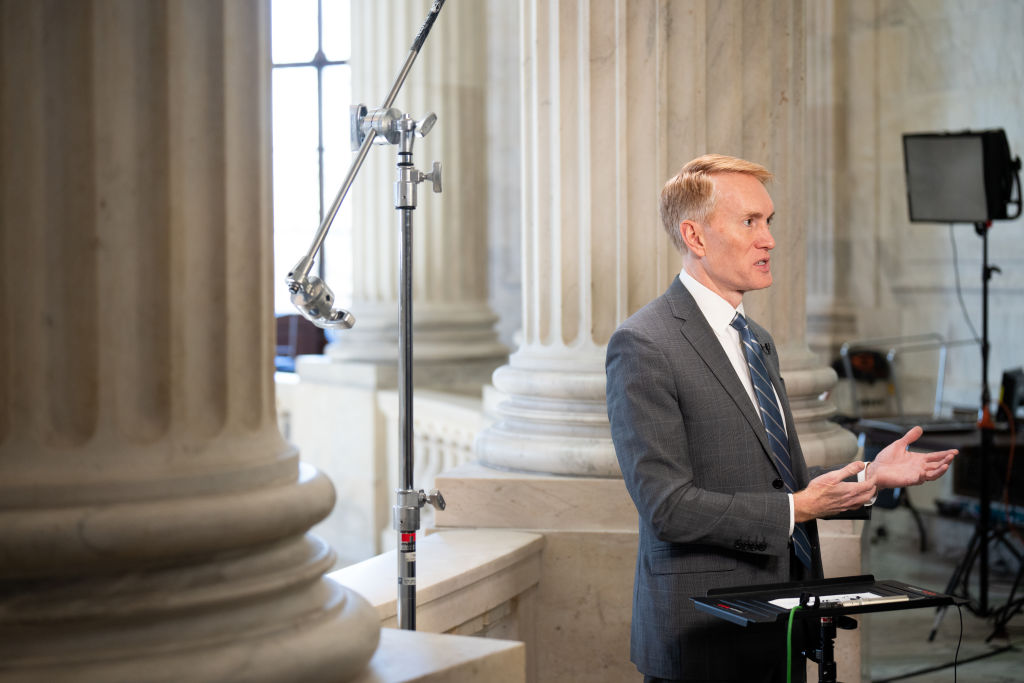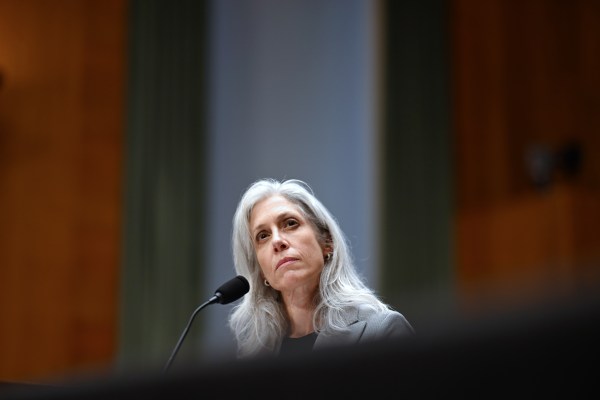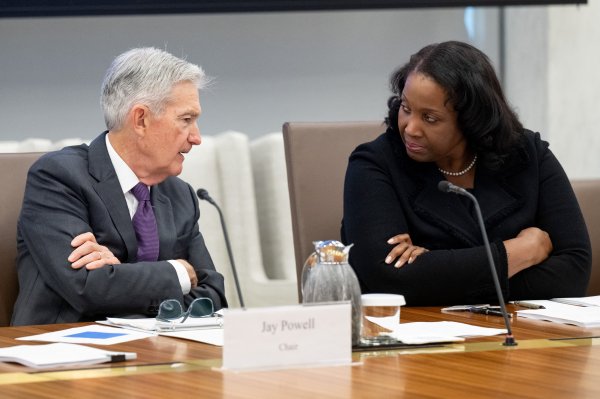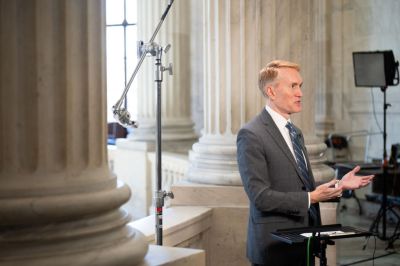Happy Wednesday! Congrats to “none of these candidates” for winning Nevada’s GOP primary last night, and to Nikki Haley for another strong second-place showing. (Donald Trump, who was not on the ballot, will participate in Nevada’s GOP caucuses later this week.)
Up to Speed
- House Republicans’ effort to impeach Homeland Security Secretary Alejandro Mayorkas failed on the House floor Tuesday night in a 214-216 vote, with three Republican defectors voting against the measure and Democratic Rep. Al Green of Texas, who had abdominal surgery last weekend, wheeled in wearing hospital scrubs to provide the pivotal vote. House Majority Leader Steve Scalise, who is battling cancer and was undergoing treatment, was not present. A fourth GOP lawmaker who supports impeachment flipped his vote to “no” to ensure Republicans can bring the impeachment resolution up again; if the House votes again this week with Scalise present and no lawmakers change their vote, the impeachment resolution will succeed.
- Ronna McDaniel, the longest-serving Republican National Committee chair since the Civil War, intends to step down from the job following the South Carolina primary, the New York Times reported Tuesday. McDaniel had become the target of many disaffected Republicans’ displeasure with the functioning of the party, and criticism of her had intensified after the party reported flimsy fundraising numbers this week. Donald Trump, who supported McDaniel since her election as chair in 2017, said Monday that “I think she knows that” she should resign. According to the Times, Trump is likely to back North Carolina party chair Michael Whatley as McDaniel’s replacement, which will be chosen by an internal election of RNC state-level officials.
- President Joe Biden on Tuesday accused Donald Trump of sabotaging the Senate border package unveiled over the weekend, saying the former president will bear responsibility for the ongoing crisis at the border should negotiations break down completely. “All indications are this bill won’t even move forward to the Senate floor,” Biden said during brief remarks at the White House. “Why? Because Donald Trump thinks it’s bad for him politically.” The White House also circulated a memo touting the Border Patrol Union’s endorsement of the bill and laying into House Speaker Mike Johnson for dismissing that endorsement as having “something to do with the pay structure that’s in the bill.” “Will House Republicans say ‘yes’ to more law enforcement like the Border Patrol, whose union supports the bipartisan deal?” the memo asks. “Or will they instead say ‘yes’ to more fentanyl and to Donald Trump’s insistence that border security be delayed in the name of politics?”
- With the border deal, which would also appropriate billions of aid to Ukraine and Israel, all but dead, some Senate defense hawks are reviving calls to pass the foreign-aid portions of the package separately—a strategy formerly rejected by Republican populists in both chambers who insisted no aid could move forward without a border-security component. “Reconstruct the package,” Sen. Lindsey Graham told Punchbowl News Tuesday. “Ukraine, Israel, Taiwan.” Meanwhile, a standalone Israel-aid measure backed by Speaker Johnson failed in the House Tuesday night, with many Democrats opposing it on the grounds that it was a ploy to short-circuit the negotiations taking place in the Senate.
Picking Up the Pieces of the Senate Border Collapse

How will voters view the collapse of the Senate border deal? “Well, it depends on one’s tribe,” GOP Sen. Todd Young of Indiana told reporters in the Capitol on Tuesday. “But for those who don’t affiliate with either tribe, I think they think this looks chaotic and puzzling. And they’re correct on both counts.”
Young said it was “highly inappropriate” for some of his congressional GOP colleagues to oppose the deal negotiated between Sens. James Lankford, a Republican, and Chris Murphy, a Democrat, before legislative text was even released late Sunday night.
Murphy himself blasted the Senate GOP, saying on Tuesday: “They told us what to do. We followed their instructions to the letter. And then they pulled the rug out from under us in twenty-four hours.” When The Dispatch asked Lankford if Murphy’s statement was correct, Lankford didn’t disagree. “Well, I think I’ll just leave that quote sitting out there,” the Oklahoma Republican replied. Earlier in the day, a reporter asked Lankford what it felt like to be run over by a bus. Lankford added that he’d also been “backed up [over].”
With most Senate Republicans and a handful of Senate Democrats balking at the deal, the shape of the immigration debate in the 2024 election will essentially boil down to this: Democrats will argue that Republicans are unwilling to compromise in order to boost Trump’s electoral prospects, while Republicans will argue President Biden is unwilling to use the executive authority he already has to stem the tide of illegal immigration.
It remains to be seen which message voters will find more salient and persuasive. The shambolic collapse of the border deal has done much to bolster the Democratic argument; Lankford himself argued there is merit to the GOP argument about executive authority—but only up to a point.
“President Obama was using the authorities a lot more than what President Biden is to be able to keep the numbers [of illegal crossings] down,” Lankford told The Dispatch. “Obviously, President Trump had three years that were very low, and he had 2019, with an extremely high amount. But even that number, I think they peaked out [at] about 4,500 [illegal crossings per day]. We’ve not had 4,500 crossings [per day] in a while under this administration. So if [President Biden] used the legal authorities that he had, we could be closer to half a million a year rather than 3 million a year just comparing it to the Obama time period.”
“Once you’re releasing people into the country, more people come immediately. That’s what the Biden administration has been unwilling to do is to stop just releasing people into the country,” Lankford added. “If you don’t stop that, [migrants] literally text friends back home and say, ‘Here’s the cartel I paid, here’s the place I cross, come join me.’”
But Lankford also argued some of his Republican colleagues are wrong to say executive power alone can solve the problem. “There’s a reason the House passed H.R. 2,” Lankford said, referring to House Republicans’ sweeping immigration bill passed earlier this year along party lines. “It wasn’t just, ‘We need executives [to] do executive things.’ There’s a gap in the law that had to be fixed.”
Some Republicans have argued that Section 212(f) of the 1952 Immigration and Nationality Act is a catchall provision that allows the president to fix the problem of illegal immigration and the abuse of the asylum system. That provision of law states: “Whenever the president finds that the entry of any aliens or of any class of aliens into the United States would be detrimental to the interests of the United States, he may by proclamation, and for such period as he shall deem necessary, suspend the entry of all aliens or any class of aliens.”
Lankford said some of his colleagues see that provision as a “magic” solution, but “the courts have said, ‘Hey, there’s more law than just that one sentence.’” In 2018, Lankford explained, “President Trump tried to use that 212(f) authority to say you can’t request asylum between ports of entry, you have to do it only at ports of entry. That went through the courts, the court said no, that exceeds presidential power. So 212(f) is not an unlimited authority to do whatever you want to be able to do. The rest of the [Immigration and Nationality Act] is also included in law.”
Nikki Haley Scales Up Campaign for Super Tuesday
Nikki Haley’s bid to catch Donald Trump in the Republican presidential primary remains a longshot’s longshot. But she is expanding her campaign infrastructure at the precise moment when any other similarly situated underdog might be teetering on the edge of collapse.
Fueled by $16.5 million and 70,000 new donors accumulated in January amid losses to frontrunner Donald Trump in the Iowa caucuses and New Hampshire primary, the Haley campaign’s growing regional political operation has deployed paid staff to several of the 16 “Super Tuesday” states that will host Republican primaries on March 5.
That effort is buttressed by what Haley campaign officials claim to The Dispatch are 20,000 volunteers scattered across the country and “Women for Nikki” chapters in all 50 states—and led locally by designated state leadership teams. The former South Carolina governor had already unveiled leadership teams in Utah and Washington state; Massachusetts was announced Wednesday, with more on tap.
Meanwhile, Haley was scheduled Wednesday to hold a campaign rally in California, at an American Legion Post in Hollywood. Haley aides say the former U.S. ambassador to the United Nations will visit at least one more Super Tuesday state before the February 24 South Carolina primary.
“We understand that we are the underdogs here, but that’s what makes this fun,” Haley campaign manager Betsy Ankney told reporters this week during a conference call. “We are going to have the resources to go the distance—exactly what that means, we’ll just continue to fight as long as we have the momentum and have the resources to do so.”
Campaign-trail fun notwithstanding, Haley’s prospects really do appear slim. Trump leads her among Republican primary voters nationally, 73.5 percent to 18.8 percent in the RealClearPolitics polling average. The former president also is poised to defeat his one-time cabinet official in South Carolina—her home turf—where he enjoys grassroots support and the backing of the state’s GOP establishment, including Gov. Henry McMaster and Sens. Lindsey Graham and Tim Scott.
But Haley’s campaign emphasized that she remains focused on the Palmetto State. She has hosted roughly one dozen campaign events across South Carolina, has dispersed a network of 2,000 volunteers there, and is in the midst of a $4 million advertising buy. The Haley campaign insists she will outperform expectations in the a primary, a winner-takes-all-delegates contest in which independents and Democrats who did not participate in their party’s nominating contest, held this past Saturday, are permitted to cast votes. (The Haley campaign isn’t specifying what constitutes “outperforming expectations” beyond vague references to doing better than the public opinion polls predict.)
But compared to the last-stand mentality that typically characterizes candidates in Haley’s position, her campaign is on the offensive and broadening its footprint in several Super Tuesday states. The Haley campaign is targeting additional states that vote before Super Tuesday, including those hosting caucuses seemingly favorable to Trump but where his stubborn opponent believes she can collect a significant number of the 1,215 delegates to the Republican convention in Milwaukee required to officially win the GOP nomination.
Given Trump’s age—he turns 78 in June—and potential danger to his 2024 prospects from 91 criminal indictments, accumulating delegates would give Haley an edge over other Republicans should the former president’s candidacy dissolve and a fight over the nomination ensue at the convention.
But first, Haley’s view of the Super Tuesday states: Of the 874 delegates up for grabs that day, roughly two-thirds are being contested in open or semi-open primaries. In other words, a voter does not have to be a registered Republican to pull the lever. In semi-open primaries, unaffiliated voters are welcome; in open primaries, so are Democrats. States with semi-open primaries include Maine, Texas, and Virginia.
The Haley campaign believes the demographics in many of the Super Tuesday primaries provide her an opportunity to overperform against Trump, because they are rich with suburban, college-educated and independent voters. Those states include Massachusetts, Minnesota, North Carolina, Utah, Vermont, and Virginia, plus Washington, D.C.
Finally, there’s Haley’s view of the caucuses being held in the U.S. Virgin Islands, Idaho, North Dakota, and Alaska. Her campaign concedes Trump’s “inherent advantage” in these contests, but says it is not “conceding anything,” noting that it has “strong leadership teams there.”
Contrast that with Thursday’s GOP caucuses in Nevada. Haley did not file to run in that contest, claiming it was rigged to favor Trump by a state party aligned with the former president, although the move also was a tacit acknowledgement that he was too strong in the Silver State to compete with there. (The Nevada GOP chose to hold a caucus. But because state law mandated government-administered, traditional primaries for both parties, Haley filed to run in that contest. It was held Tuesday, and, although her campaign emphasizes it did not invest in Nevada, Haley finished an embarrassing second to “none of these candidates.”)
Underlying Haley’s strategically rosy assessment of how Super Tuesday might reset the Republican race is the hope that, as Trump did in the 2016 primary, the GOP electorate in these states is ripe for growth, and should that come to fruition, she stands to benefit. “Turnout in the 2016 GOP primary averaged 14.8 percent,” Ankney told The Dispatch during a brief telephone interview Tuesday. “Historically, a very small percentage of people participate in the Republican primary process. We’re working to grow the electorate and bring more people into the fold.”
Notable and Quotable
“The Bud Light ad was a mistake of epic proportions, and for that a very big price was paid, but Anheuser-Busch is not a Woke company, but I can give you plenty that are, and might just release it for the World to see. … Anheuser-Busch is a Great American Brand that perhaps deserves a Second Chance? What do you think? Perhaps, instead, we should be going after those companies that are looking to DESTROY AMERICA!”
—Former President Donald Trump in a social media post, February 6, 2024







Please note that we at The Dispatch hold ourselves, our work, and our commenters to a higher standard than other places on the internet. We welcome comments that foster genuine debate or discussion—including comments critical of us or our work—but responses that include ad hominem attacks on fellow Dispatch members or are intended to stoke fear and anger may be moderated.
With your membership, you only have the ability to comment on The Morning Dispatch articles. Consider upgrading to join the conversation everywhere.